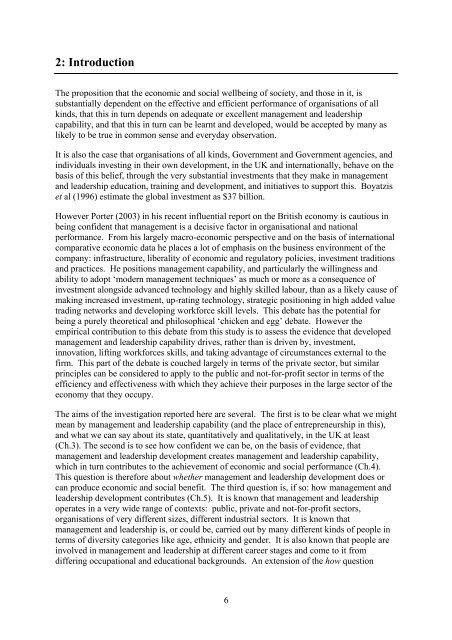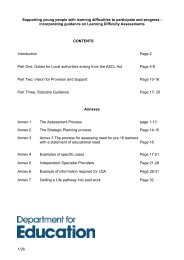The Development of Management and Leadership Capability and its ...
The Development of Management and Leadership Capability and its ...
The Development of Management and Leadership Capability and its ...
Create successful ePaper yourself
Turn your PDF publications into a flip-book with our unique Google optimized e-Paper software.
2: Introduction<br />
<strong>The</strong> proposition that the economic <strong>and</strong> social wellbeing <strong>of</strong> society, <strong>and</strong> those in it, is<br />
substantially dependent on the effective <strong>and</strong> efficient performance <strong>of</strong> organisations <strong>of</strong> all<br />
kinds, that this in turn depends on adequate or excellent management <strong>and</strong> leadership<br />
capability, <strong>and</strong> that this in turn can be learnt <strong>and</strong> developed, would be accepted by many as<br />
likely to be true in common sense <strong>and</strong> everyday observation.<br />
It is also the case that organisations <strong>of</strong> all kinds, Government <strong>and</strong> Government agencies, <strong>and</strong><br />
individuals investing in their own development, in the UK <strong>and</strong> internationally, behave on the<br />
basis <strong>of</strong> this belief, through the very substantial investments that they make in management<br />
<strong>and</strong> leadership education, training <strong>and</strong> development, <strong>and</strong> initiatives to support this. Boyatzis<br />
et al (1996) estimate the global investment as $37 billion.<br />
However Porter (2003) in his recent influential report on the British economy is cautious in<br />
being confident that management is a decisive factor in organisational <strong>and</strong> national<br />
performance. From his largely macro-economic perspective <strong>and</strong> on the basis <strong>of</strong> international<br />
comparative economic data he places a lot <strong>of</strong> emphasis on the business environment <strong>of</strong> the<br />
company: infrastructure, liberality <strong>of</strong> economic <strong>and</strong> regulatory policies, investment traditions<br />
<strong>and</strong> practices. He positions management capability, <strong>and</strong> particularly the willingness <strong>and</strong><br />
ability to adopt ‘modern management techniques’ as much or more as a consequence <strong>of</strong><br />
investment alongside advanced technology <strong>and</strong> highly skilled labour, than as a likely cause <strong>of</strong><br />
making increased investment, up-rating technology, strategic positioning in high added value<br />
trading networks <strong>and</strong> developing workforce skill levels. This debate has the potential for<br />
being a purely theoretical <strong>and</strong> philosophical ‘chicken <strong>and</strong> egg’ debate. However the<br />
empirical contribution to this debate from this study is to assess the evidence that developed<br />
management <strong>and</strong> leadership capability drives, rather than is driven by, investment,<br />
innovation, lifting workforces skills, <strong>and</strong> taking advantage <strong>of</strong> circumstances external to the<br />
firm. This part <strong>of</strong> the debate is couched largely in terms <strong>of</strong> the private sector, but similar<br />
principles can be considered to apply to the public <strong>and</strong> not-for-pr<strong>of</strong>it sector in terms <strong>of</strong> the<br />
efficiency <strong>and</strong> effectiveness with which they achieve their purposes in the large sector <strong>of</strong> the<br />
economy that they occupy.<br />
<strong>The</strong> aims <strong>of</strong> the investigation reported here are several. <strong>The</strong> first is to be clear what we might<br />
mean by management <strong>and</strong> leadership capability (<strong>and</strong> the place <strong>of</strong> entrepreneurship in this),<br />
<strong>and</strong> what we can say about <strong>its</strong> state, quantitatively <strong>and</strong> qualitatively, in the UK at least<br />
(Ch.3). <strong>The</strong> second is to see how confident we can be, on the basis <strong>of</strong> evidence, that<br />
management <strong>and</strong> leadership development creates management <strong>and</strong> leadership capability,<br />
which in turn contributes to the achievement <strong>of</strong> economic <strong>and</strong> social performance (Ch.4).<br />
This question is therefore about whether management <strong>and</strong> leadership development does or<br />
can produce economic <strong>and</strong> social benefit. <strong>The</strong> third question is, if so: how management <strong>and</strong><br />
leadership development contributes (Ch.5). It is known that management <strong>and</strong> leadership<br />
operates in a very wide range <strong>of</strong> contexts: public, private <strong>and</strong> not-for-pr<strong>of</strong>it sectors,<br />
organisations <strong>of</strong> very different sizes, different industrial sectors. It is known that<br />
management <strong>and</strong> leadership is, or could be, carried out by many different kinds <strong>of</strong> people in<br />
terms <strong>of</strong> diversity categories like age, ethnicity <strong>and</strong> gender. It is also known that people are<br />
involved in management <strong>and</strong> leadership at different career stages <strong>and</strong> come to it from<br />
differing occupational <strong>and</strong> educational backgrounds. An extension <strong>of</strong> the how question<br />
6
















